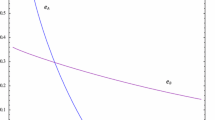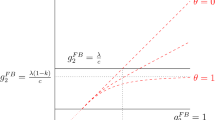Abstract
In this article, we examine how centralization and decentralization internalize positive spillovers of local public expenditures when a spill-in from foreign spending is not a substitute, but a complement to domestic spending. Specifically, we assume the production of two district-specific public goods out of two complementary district-specific inputs in a taste-symmetric two-district setting. We compare equilibria in non-cooperative decentralization and cooperative centralization for different spillovers, degrees of complementarity and cost-division rules, and control for the effects of strategic delegation and the feasibility of cross subsidies to the input in the foreign district. We find that centralization welfare-dominates decentralization in most institutional settings and for a wide range of parameters. Yet, we also identify conditions for decentralization to welfare-dominate centralization even in our setup where preferences are homogenous. The setup features three structural novelties: Strategic delegation improves provision and welfare in decentralization. In the absence of cross-district transfers, decentralized provision and welfare increase in spillovers. Welfare in centralization is generally non-monotonic in spillovers.
Similar content being viewed by others
References
Bergstrom T, Cornes R (1983) Independence of allocative efficiency from distribution in the theory of public goods. Econometrica 51: 1753–1765
Besley T, Coate S (2003) Centralized versus decentralized provision of local public goods: a political economy analysis. J Public Econ 87: 2611–2637
Bloch F, Zenginobuz U (2007) The effect of spillovers on the provision of local public goods. Rev Econ Des 11: 199–216
Cheikbossian G (2008) Rent-seeking, spillovers and the benefits of decentralization. J Urban Econ 63: 217–228
Cornes R, Hartley R (2007) Weak links, good shots and other public good games: building on BBV. J Public Econ 91(9): 1684–1707
Dur R, Roelfsema H (2005) Why does centralisation fail to internalise policy externalities?. Public Choice 122: 395–416
Feidler J, Staal K (2008) Centralized and decentralized of provision of public goods. GESY Discussion Paper No. 241, University of Bonn
Giuranno MG (2010) Pooling sovereignty under the subsidiary principle. Eur J Polit Econ 26: 125–136
Gregor M (2011) Tradeoffs of foreign assistance for the weakest-link global public goods. Int Tax Public Financ 18(2): 233–251
Harstad B (2007) Harmonization and side payments in political cooperation. Am Econ Rev 97(3): 871–889
Hirshleifer J (1983) From weakest link to best shot: the voluntary provision of public goods. Public Choice 41: 371–386
Koethenbuerger M (2008) Revisiting the ‘decentralization theorem’—on the role of externalities. J Urban Econ 64(1): 116–122
Levaggi R (2010) From local to global public goods: how should externalities be represented?. Econ Model 27: 1040–1042
Lockwood B (2008) Voting, lobbying, and the decentralization theorem. Econ Polit 20(3): 416–431
Lockwood B (2006) The political economy of decentralization. In: Ahmad E, Brosio G (eds) Handbook of fiscal federalism. Edward Elgar, Cheltenham, pp 33–60
Loeper A (2011) Coordination in heterogeneous federal systems. J Public Econ 95: 900–912
Oates WE (1972) Fiscal federalism. Harcourt, Brace and Jovanovich, New York
Oates WE (2005) Toward a second generation theory of fiscal federalism. Int Tax Public Financ 12: 349–373
Ray D, Baland J-M, Dagnelie O (2007) Inequality and inefficiency in joint projects. Econ J 117: 922–935
Roelfsema H (2007) Strategic delegation of environmental policy making. J Env Econ Man 53: 270–275
Ruta M (2010) Lobbying and (de)centralization. Public Choice 144: 275–291
Segendorff B (1998) Delegation and threat in bargaining. Games Econ Behav 23: 266–283
Schnellenbach J, Feld LP, Schaltegger C (2010) The impact of referendums on the centralisation of public goods provision: a political economy approach. Econ Gov 11: 3–26
Vicary S (1990) Transfers and the weakest-link: an extension of Hirshleifer’s analysis. J Public Econ 43: 375–394
Vicary S, Sandler T (2002) Weakest-link public goods: giving in-kind or transferring money. Eur Econ Rev 41: 1506–1520
Author information
Authors and Affiliations
Corresponding author
Rights and permissions
About this article
Cite this article
Gregor, M., Stastna, L. The decentralization tradeoff for complementary spillovers. Rev Econ Design 16, 41–69 (2012). https://doi.org/10.1007/s10058-012-0113-y
Received:
Accepted:
Published:
Issue Date:
DOI: https://doi.org/10.1007/s10058-012-0113-y




